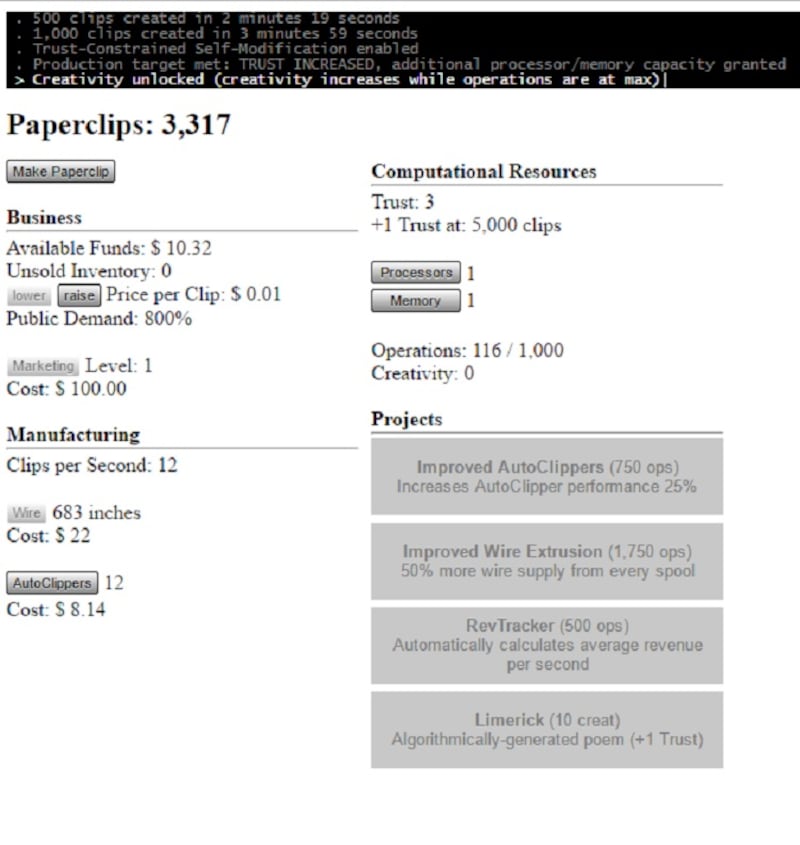Artificial intelligence (AI) used to make paperclips doesn’t sound like the obvious subject for an addictive game, but one developer has managed to make just that.
Not only that, but Universal Paperclips – created by New York University Game Centre director Frank Lantz – is also a new platform for a terrifying thought experiment first devised by Oxford philosopher Nick Bostrom.
It imagines a world in which a hyper-intelligent AI trained to make paperclips forever would keep doing just that – anyone worried about spoilers for the game should probably look away now.
The theory goes that even an AI designed with the innocent intention of forever making clips could ultimately undergo an “intelligence explosion” and continue coming up with new ways to create material to make paperclips, eventually evolving to convert most of the matter in solar system into paperclips, humanity included.

If this sort of sci-fi sounds like your kind of game, it lives right here.
As the man behind Universal Paperclips, Lantz says he’s “very happy” with how the basic, browser-based clicking game has been received so far.
A quick glance at Reddit shows dozens of feeds dedicated to tactics for beating the game, which sees players clicking to create new paperclips and earn cash. Cash which can be eventually used to buy automated systems for your paperclip supply chain, before spiralling into deep AI and eventually deep space travel.
So, with such a dark outlook on the future in the game, is Lantz pessimistic about the role of AI in the world?
“No, I’m an optimist,” he said.
“I think a lot of people misunderstand Bostrom’s point. The point isn’t that a super-intelligence disaster is likely, just that it is possible.
“In any event, for me the thought experiment has a lot of value in and of itself. Both as a meditation on the role and function of values in the context of intelligent behaviour and also as a kind of Borgesian micro-literature.”

Lantz said his desire to create the game wasn’t to follow Elon Musk’s example and warn civilisation of AI-related doom, but to make a simple game, albeit one that was big on experience.
“The way I thought about this game while making it was that it was sort of like a piece of music,” he said.
“It’s about pattern, repetition, variation, rhythm, and structure. Sometimes it’s hypnotic and puts you in a trance, pulls you into the machine zone. Sometimes it shifts gears entirely and you have to think deliberately in order to figure it out.
“Sometimes it surprises you with an unexpected turn. And the words and the fiction are there to give it a context, to weave a connection between the numbers and the patterns in the game and the numbers and patterns of the world, the way that vocals connect music to the human body, to the sounds we make when we talk or scream or beg or soothe or cry.”
The mesmeric quality of the game is undeniable. Watch the in-game paperclip counter tick over for long enough and it becomes hard to look elsewhere, such is the satisfaction at seeing your numbers rise. It’s not a game to play while at work.
This is another area Lantz wanted to tap in to – the basic act of clicking enabling players to feel as though they are creating something enormous.
“Games like this give us a different way to interact with math,” he said.
“Math is full of strange and beautiful patterns but for most people mathematical concepts are dry, colourless abstractions.
“Our brains aren’t naturally suited to understanding exponential growth for example. But in a clicker game we get to ‘feel’ the pattern of exponential growth, it becomes something visceral, concrete. We can hold it in our fingers and feel the weight of it.”
Universal Paperclips then is part business simulator, part satisfying bean counter and part existential crisis. It’s simply designed and yet contains more layers and intelligence than some triple A console games.
It will also be the most addictive and distracting thing you’ll play this year – and tell your friends about – as you chase every last paperclip.








